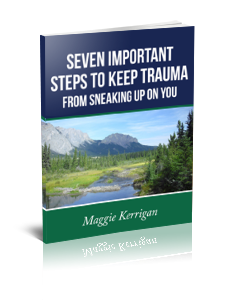Shock Trauma
 How Do You Recognize Shock Trauma?
How Do You Recognize Shock Trauma?
It happens quickly and it is beyond your control. You are frightened and helpless. You freeze. It is as though your nervous system is wired for 110 volts and it gets hit with 220 volts.
As a result, you
- Are so overwhelmed that you simply could not respond. You froze.
- Lie awake at night, remembering over and over again the details of what happened.
- Are always on the lookout in case it happens again.
- Find it difficult to concentrate.
- Snap at your partner and don’t know why.
- Avoid going near the site where it happened and if you see it happening on TV, you get really angry.
- No longer feel like yourself and act in ways toward loved ones that you later regret.
What is Shock Trauma?
Shock trauma is one main category of trauma. It refers to the impact of a time- limited event that has a beginning, middle and end. It is the sense of frozen helplessness that causes the symptoms. This is in contrast to developmental trauma which extends for a longer period of time during your younger years.
The word “trauma” can describe what happens as a result of the mundane to the extra-ordinary events in our lives. For some, missing a bus, sustaining a rear end collision, receiving medical care and falling off a ladder all fit under the this trauma category.
I have heard elders refer to this kind of trauma as the loss of dear friend, having to move out of a house and transitioning to retirement. The effects of serious injuries, long incapacitating illnesses, abuse, or violent attack also can refer to this kind of trauma.
There Is Hope
Experiencing a trauma can disrupt your life. Fortunately, that event does not have to cause you months or years of agony. Just like mammals in the wild, who face near-death daily and who do not end up with post-traumatic stress disorder (PTSD), humans also have the capacity to return to normal after a frightening situation. No matter how long ago the trauma occurred, your brain is wired to know how to navigate out of that experience. With the appropriate guidance, I can help can lead you out of the trauma response.
You Are Not Alone
There is no one “right” way to respond to something terrible. Responding the way you did does not mean you are stupid or weak or you have done something wrong. The response happened automatically through parts of your unconscious brain. You did what you could to survive considering the help, time and space you had available. Your physiology took over and did what it could under stress. Your nervous system is designed so that your analytical mind took a back seat during threatening times.
While you may wonder why you could have not done something differently, your analytical mind, while very powerful in many ways, would have reacted much too slowly to help when you were faced with the threat. Fortunately for you, your unconscious mind took over and kept you alive.
But Wait…
I feel pretty miserable and no one seems to know what is wrong with me, but I don’t want to know if I had something traumatic happen.
Admittedly, thinking in terms of shock trauma can be scary and possibly disruptive to how you have viewed your life. However, if you suspect that some of your symptoms may be trauma related, telling your health care provider could save you money and time on ineffectual treatments.
Aren’t I just being weak when I give into the notion that I have been traumatized?
Actually, admitting that you have been traumatized and seeking treatment can take courage. It may mean you no longer keep the assault a secret or that you something like a “minor” car accident still affects you years later. Trauma therapy can actually be life transforming; something that you once viewed as shameful and humiliating becomes the avenue for significant positive changes in your life.
This Example Might Give You a Better Feel for the Often Overlooked Effects of Trauma
The mother had unexplained panic attacks for a year. She lived in fear that her son would die. During the day, she knew that as a mother of an active 8 year old, she should let him be free to explore his environment more than she was willing.
She tried talking to other therapists about her fears, but this did not give her any relief. In fact, sometimes she became even more anxious.
A friend had told her about a special kind of trauma work that I do. Knowing that there often is a link between significant threats and anxiety, the first thing I asked was, “Had anything happened shortly before the panic attacks began?” In response, the mother remembered that they had begun shortly after her son nearly drowned. Before he knew how to swim, her boy had ventured into the deeper water and bobbed up and down before she could reach him and pull him to safety.
The shock of seeing her son go under the water got stored in the part of the brain that controls how she moves and uses her senses. It was this part of the brain that needed to be accessed if the mother were to ever be free of the panic attacks. Until this happened, her brain could not really register that she successfully rescued her son.
Working slowly as to not overwhelm the mother, I gradually helped her to let go of each piece of fear. To her surprise, the mother literally felt her body go through the motions of looking toward her son then moving forward to rescue him. These motions arose from within the mom. I had not guided her to do them. The mother was able to come out of her frozen state of seeing her son go under to experiencing the satisfaction of successfully rescuing her boy.
By the end of the trauma therapy mom finally felt more relaxed, and shortly afterwards the panic attacks stopped completely. For this mom it had been essential to work directly with her body in order to be able to bring the event to completion.
Getting the Right Help
To effectively address the symptoms of trauma, it is essential that the therapy include awareness of how the physiology is affected. Otherwise, the symptoms persist regardless of how much you understand how and why the event happened.
Many clients have come to me after years of cognitive or behavioral therapy. They complain that while they may have learned how to “manage” or override they symptoms, the symptoms have not really gone away.
I also have clients, who have tried medical interventions to address physical pain that results from shock trauma. The physical therapy or drugs were not as effective as they wished. Their neck or back are locked because their body is still remembering the accident or fall and wants to brace against it.
I am specifically trained to work with trauma using a body based approach called Somatic Experiencing (SE). With 25 years of experience in the field of trauma first as a massage therapist and now as a psychotherapist, I understand how traumatic events affect the body and how to engage the nervous system so it releases the fear and impulse to protect itself.
What to Do Next?
You may need more information about trauma. Two very good sources of information are in my free newsletter Healing AfterTrauma and the blogs I write about shock trauma and its treatment. You can subscribe by simply completing the boxes on this page. In addition, the resource page can direct you to books and videos you may find helpful.
If you are considering working with me, I offer a 30-minute complementary consult. That way you and I will get to see if we are a good fit for one another. I can be reached at 720-635-7943 or send me an email on my contact page.





